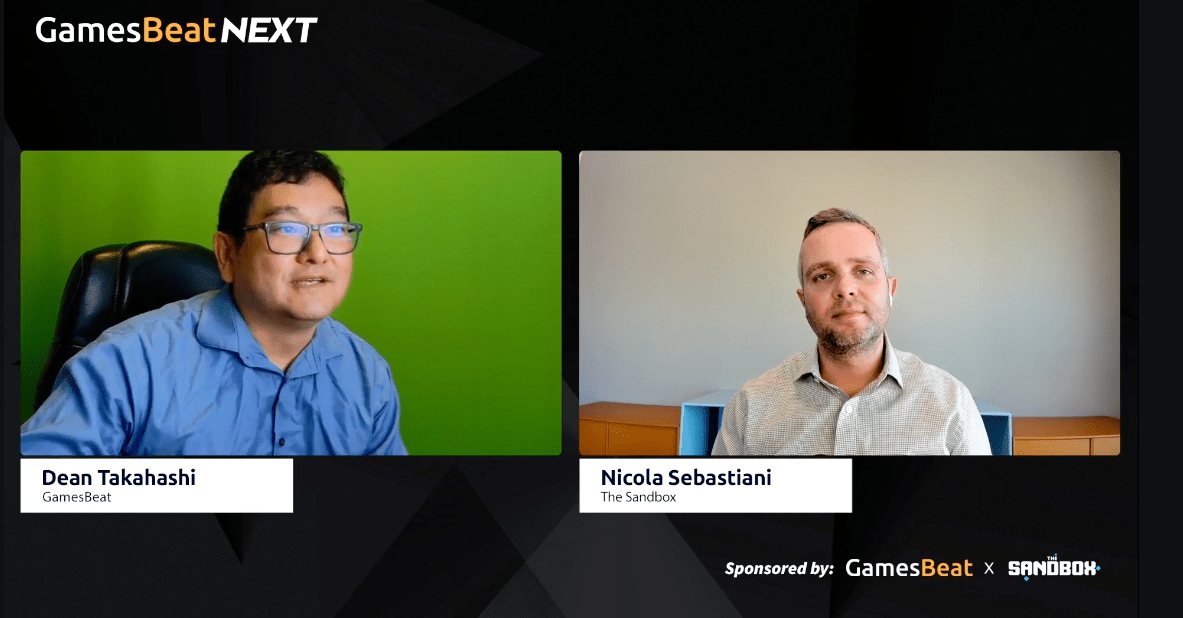GamesBeat Next: Why creators are the future of the gaming industry

The overarching theme of this year’s GamesBeat Next conference is “Playing the Edge” — in other words, the technologies, innovations and initiatives sitting at the edge of the gaming industry that have potential to become industry game-changers. User-generated content is one of the areas with the most promise, says Dean Takahashi, Lead Writer at GamesBeat. He spoke with Nicola Sebastiani, chief content officer at The Sandbox, during a special preview session for the conference, about how developers can power brands and creators with immersive experiences and tools.
“We are at a critical time in gaming right now,” Sebastiani says. “We are entering what I call or what I like to think of a creator economy, where UGC is taking over and where everybody can just start a studio and build and make something and ideally make a living with it. You see that it really impacted the video industry during the past decade — think of YouTube — and I think we’re in a great position to be successful in this tidal wave.”
The decentralized nature of user-created content provides that extra leverage and sense of ownership to creators, and gives the power back to the community, he added, and that’s not only a unique selling point, but will pay dividends in the future.
The role of creators in the gaming industry
Creators are at the forefront of gaming, Sebastiani says, especially as the barriers to create and make games and other interactive entertainment are lowered, which is foundational to the growth of the industry. The barrier that remains is the difficulty of users making significant revenue from their work.
“And in mobile, in the traditional gaming industry, the pie is very top-heavy,” he says. “The winners take most of the revenues. I would like the rewards to be more spread out across the community. And I would like to use my experiences in building and managing platforms, dealing with creators’ communities to empower creators to get there with fair economics for everyone — to keep pushing them to move fast, break things, do it all over again and help us become better as a platform.”
When deciding what platforms to invest their time in, creators look for a fair economy, a platform that recognizes creators are its lifeblood and rewards them and shares success with them in a variety of ways.
“Professional development opportunities, continuous education, essentially reinvesting in your creators to have them build the skills, go from good to great, become better and better, or as good as they want to be,” Sebastian says. “And then I think something really important is a friendly and supportive community. A community that creates, that fosters a sense of belonging, where people can make friends, they can build a reputation, they can find their team. Another lesson we got from traditional video games, is getting communities that care and that carry you over the years is very important.”
Taking UGC and The Sandbox into the future
“My main goal is to ensure that creators and player have a blast,” Sebastiani says. “I need to establish and foster a great ecosystem of partners from all over the world. Here I’m thinking of large devs like Ubisoft, but really also the scrappy two-people team from a garage. Anybody who loves games and entertainment and wants to express themselves, should know that we’re listening, that we’re inviting them to reach out.”
Overseeing the company’s portfolio strategy means asking what the narrative of the platform should be, from the tone to the type of experiences they want to push to their users. It’s also crucial the content appeals to a broad audience in terms of inclusion and diversity, he adds, while partners are building landmark experiences based on the company’s brands, like Snoop Dogg or Cut the Road.
The Sandbox believes it’s crucial that the creator economy be creator-focused, he adds. There’s a 5% platform fee, half of which gets reinvested in the community via the Game Maker Fund and other programs. And making a game that turns out to be a big hit gets creators to a level of visibility and success that, he says, is far harder to reach on other platforms.
The Sandbox is also a social platform, he explains, with a vibrant community of players, creators, brands and celebrities, given the opportunity to connect. With that kind of access, creators can develop game jams that are IP-inspired. And while today most of the platform’s content is games, he doesn’t envision it continuing that way.
“I don’t think it has to be that,” Sebastiani explains. “I really want to encourage everyone to express themselves in the way that they want. So go make a fashion show, build a music experience, build a virtual home, build an interactive story. We’re no-code. You can just download the Game Maker and start building with no skills and no coding skills.”













